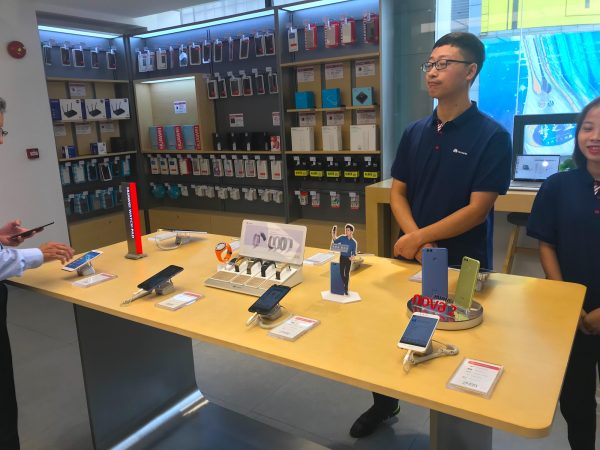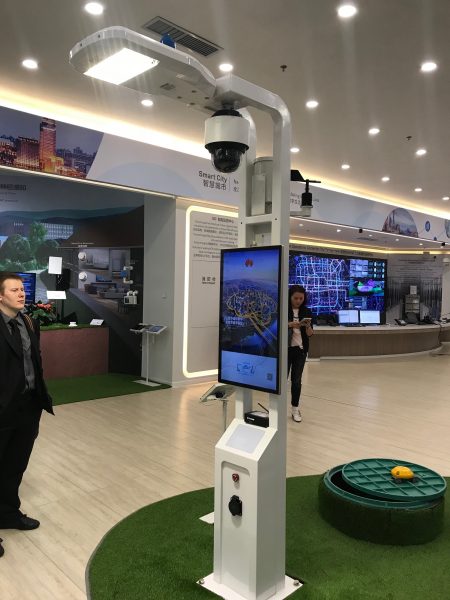
A glimpse into one of Huawei’s campuses in Beijing, China. This is the entrance to their technology showcase. Yes, it looks like something out of Star Trek.
Thanks to beautiful premium mobile devices like the Mate 10, P10 and Watch 2, Huawei has become a powerhouse with consumers overseas. Yet, the Chinese megacorp’s brand recognition and presence in the U.S. is still very much a work in progress.
I got to visit Huawei last week and the experience surprised me in several ways. Here are 7 things that I learned while visiting Huawei that totally surprised me.
- Despite being a relative newcomer in the U.S., Huawei is the no. 3 smartphone manufacturer globally – right after Samsung (no. 1) and Apple (no. 2).
- Huawei has built 1500 networks globally, and they provide global network service to a third of the world’s population.
- Think Apple’s new campus is spectacular? Huawei is building a new campus in Dongguan, China that looks like it may end up wiping the floor with Apple’s campus in many ways – and yet no one is talking about it – at least not yet. The campus is being designed to resemble multiple European cities, using a mixture of several European architectural styles ranging from Mediterranean to Gothic and everything in between. There is even a beautiful clock tower on campus. A special train is being built for employees to use to get there.
- Their phone manufacturing facilities and tech campuses are incredibly state of the art. When phone companies come to mind, a lot of us tend to picture a dimly lit, sketchy environment somewhere in China that packs in people in like sardines. Yes, I went there. It turns out that that’s the furthest possible from the truth for Huawei. I got to take a tour of Huawei’s factory and was blown away by the efficiency and the good working conditions there. Granted, I was on an escorted media tour, but I was still very impressed. Factory workers are encouraged to come up with suggestions and to be a part of the process. Huawei also told us that their phone manufacturing process actually takes fewer steps, and is more streamlined and efficient than the iPhone’s manufacturing process. After seeing just how high tech their “assembly line” is, I’m sure that that statement is true.
- Huawei encourages and promotes females in tech. I toured Huawei’s campuses in Shenzhen and Beijing, and in each city, I encountered many women working in different facets of the corporation, from executive level to software and engineering. Could there be more women working there? Sure. But it looks like Huawei is actively taking the steps to encourage more women to work in tech.
- Huawei is investing a ton of money in R&D. So much so that they have 16 R&D centers globally and 7000 R&D staff members. This R&D goes beyond just smartphones, tablets, laptops and wearables. To that effect, they have developed tech for everything from super advanced conference video call systems for meeting rooms, to security systems that assist law enforcement when combatting terrorism, as well as comprehensive tech for building smarter cities.
- Huawei’s brand, Honor, is the no. 1 e-commerce phone brand in the USA and I highly recommend the brand if you’re looking for a great unlocked mid-range phone sans contract.
These 7 facts about Huawei are just the tip of the iceberg. One thing’s for sure, while so many other mobile manufacturers are struggling, this a mobile phone company to keep an eye for in 2017 and beyond.

Huawei’s retail store and service center in Shenzhen, China is very similar to what Apple and Microsoft stores are like here in the U.S.

This smart lamp designed by Huawei offers a glimpse into the future of smart cities
Filed in categories: Articles
Tagged: huawei
7 Surprising things you probably didn’t know about Huawei originally appeared on The Gadgeteer on October 22, 2017 at 8:00 am.
Note: If you are subscribed to this feed through FeedBurner, please switch to our native feed URL http://the-gadgeteer.com/feed/ in order to ensure continuous delivery.
